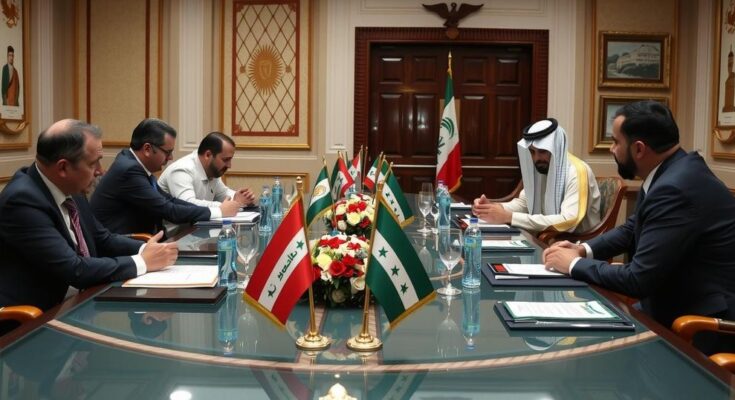Secretary Blinken met with Arab foreign ministers in Jordan to discuss a political transition in Syria after the removal of Bashar al-Assad, addressing regional stability and the emergence of new leadership amid rising Turkish influence and ongoing Israeli airstrikes.
On Saturday, Secretary of State Antony J. Blinken convened discussions in Jordan with Arab leaders concerning the political transition in Syria following the recent overthrow of the long-standing dictator, Bashar al-Assad. This meeting, attended by foreign ministers from Jordan, Saudi Arabia, Iraq, Lebanon, and Egypt, alongside the secretary general of the Arab League, focused on establishing a Syria-led political process aimed at fostering a stable transitional solution. The gathering reflects a growing regional alignment in response to Assad’s ousting.
The recent upheaval in Syria, marked by celebrations alongside apprehension about the new administration under caretaker Prime Minister Mohammed al-Bashir, represents a critical juncture in a nation reeling from a protracted conflict. With the Turkish government strengthening its involvement and planning to reopen its embassy in Damascus, tensions escalate, particularly regarding Kurdish militias such as the People’s Protection Units (YPG). Turkish Foreign Minister Hakan Fidan explicitly admonished YPG members to depart Syria urgently, illustrating the complex interplay of regional dynamics.
This situation has revived concerns in the United States over potential instability spilling into neighboring countries, recalling the origins of the Islamic State’s emergence amid Syria’s civil war. Concurrently, Israel has capitalized on this chaos, conducting airstrikes to neutralize perceived threats from the remaining remnants of the Assad regime. In reaction, Syria condemned Israel’s actions and called for international intervention to halt further aggressions.
Blinken’s diplomatic tour of the Middle East, which included stops in Turkey and Iraq, underscores the robust international assessment of the aftermath of Assad’s rule. The ongoing discussions emphasize the necessity for a cohesive and inclusive plan for Syria’s future, recognizing the complexities involved and the interests of various stakeholders in the region.
This article centers on the diplomatic efforts led by U.S. Secretary of State Antony J. Blinken to facilitate a political transition in Syria following the recent ousting of President Bashar al-Assad. The meeting in Jordan brings together key Arab foreign ministers and regional players amidst a backdrop of shifting power dynamics and increasing Turkish influence in the Syrian crisis. The region faces long-standing issues stemming from years of conflict, sectarian strife, and external interventions, raising essential questions regarding stability and governance in Syria.
The meetings held by Secretary Blinken with Arab leaders in Jordan represent a significant attempt to address the political transition in Syria following Assad’s ouster. The gathering’s emphasis on a Syria-led political process highlights the complexities of establishing stability in a war-torn nation. With various regional actors’ interests at play, the future of Syria remains uncertain, necessitating continued international dialogue and cooperation to navigate this critical juncture.
Original Source: www.nytimes.com




